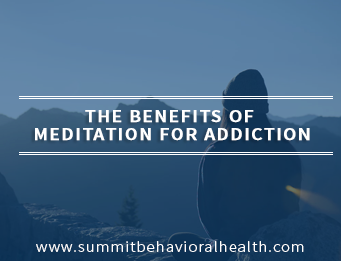While recovery is a relief from active addiction for most people, it isn’t without its own challenges. It can be very stressful for those who are new in recovery to deal with cravings, rebuild relationships, and clean up the wreckage that their addiction caused, all while trying to hang onto their newfound sobriety. Part of early recovery involves learning to cope with life’s challenges in new ways as the old way of dealing with things – using drugs or alcohol – is no longer an option.
If you are new in recovery, or you have been sober for a while but still struggle to handle difficult situations with new coping skills, it is worth considering the practice of meditation to help you deal with stress, anxiety, and depression. Daily meditation can also help you to have more patience and resilience with what life throws at you.
Meditation and Mindfulness for Addiction Recovery
Meditation involves being mindful. What exactly is mindfulness? Generally speaking, it’s being aware of your thoughts, feelings, and sensory experiences, right now, in the current moment. There are many benefits of using mindfulness during meditation as a daily practice, many of which can make a significant difference in your recovery.
Benefits of Meditation
Practicing mindfulness meditation means that you are regulating your attention. In essence, you implement the attitude of an observer of what you are currently experiencing. It’s a simple concept, but it does take practice to accomplish. What can you expect in terms of results? Here are just a few of the benefits you will see when you meditate.
Increased Self-Acceptance
We are often harder on ourselves than we are on others – especially when we are in addiction recovery. Because mindfulness encourages observation and attentiveness to your own thoughts and feelings, it makes it easier to be patient with yourself and your emotions. You become able to treat yourself with the same patience and acceptance that you would likely extend to others who are in the same situation.
Increased Attention
Being mindful means paying attention to right now, not dwelling in the past or worrying about the future. When you take the time to develop a practice of mindful meditation, you are more able to enjoy the current moment. That means that whatever situation you are involved in, you will be able to be there fully, enjoying the moment for what it is.
Improved Physical Health
Meditation isn’t only good for your mental health, it can also positively affect your physical health as well. When you develop self-awareness using meditation, you will likely experience a positive impact on your stress and anxiety levels, which can help reduce your risk of developing related medical issues like hypertension, heart problems, and other stress-induced illnesses. Because meditation lowers stress and anxiety, it also helps reduce the risk of depression – which is a common occurrence in people with addiction issues. It has also been shown to help improve your quality of sleep and help those who suffer from insomnia.
Increased Resilience
People in addiction recovery are often some of the most resilient people you will meet. The ability to bounce back from challenging (sometimes seemingly impossible) situations and adapting to change are two things that are exceedingly necessary to recovery. Research shows that practicing mindful meditation, even in small amounts, can help users cultivate increased levels of resilience. Being able to rebound after challenging situations is key to recovery and to preventing a potential relapse.
Meditation Works Even When You’re Not Actively Practicing It
For meditation to be beneficial, you don’t have to be actively engaged in it. In other words, you will see the benefits of your meditation practice even when you are going about your daily routine. According to a study in the Frontiers in Human Neuroscience journal, meditation changes your brain. The amygdala region of the brain’s response to emotional stimuli is positively affected by meditation – and that change means that you will feel the positive effects even when you are not actually meditating.
Are You Ready to Meditate?
Meditation may feel strange at first, but when you are able to be mindful and aware of your thoughts, feelings, and senses, you will reap the rewards that come along with it. The practice will help you during the rough spots in your recovery and will enhance your positive experiences even further.
If you or your loved one is struggling with addiction, you should seek professional help from a holistic rehabilitation program. Many addiction treatment facilities, like Serenity at Summit, use meditation as part of their holistic approach to recovery from drug and alcohol addiction. Contact Serenity today at [phone_number] to start your recovery and to learn to get the most from every moment.

